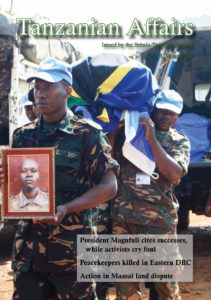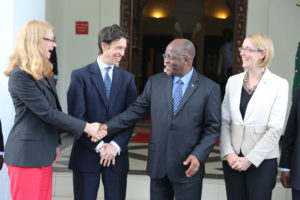by Ben Taylor
President Magufuli marked his first two years in office by celebrating ten key achievements. The Director General of Tanzania Information Services and Chief government spokesman, Hassan Abbasi, listed these as:
•Restoration of discipline among public servants resulting in an increase of productivity in service delivery.
•Control of government expenditure and enhancemant of value for money in all state funded projects. This included the removal of 32,000 names from the government payroll who were either ghost workers or public servants holding fake academic certificates, saving a total of TShs 378 billion.
•The anti-corruption war, including the establishment of an anti-graft
court, the dismissal of dishonest public officials and the arrest of the alleged masterminds behind the Escrow case.
•Increased control on the protection of natural resources such as minerals, including the signing of three mineral laws and changes which laid reforms in the extractive industry.
•Cost cutting measures that saw fewer foreign trips by government officials and cuts in the budgets for unnecessary workshops.
•Moving the government capital to Dodoma; Mr Abbasi described this as “a dream for a long time, at the beginning no one expected it would
be possible, but the dream has become true.”
•Reduced dependency on donors when it comes to implementing
development projects. He said this was made possible by an increase of government revenue collection of around 50%.
•Bringing social services closer to the people including provision of free education, implementation of water projects across the country, and increased budget for higher education loans.
•Initiation of the Standard Gauge Railway (SGR), starting with domestic funding, and the revival of Air Tanzania.
•The industrialisation drive which, according to Dr Abbasi, has revived 17 factories and “created a conducive environment that has attracted over 3,000 investors who are building factories all over the country.”
More detail on several of these points can be found elsewhere in this issue, including on mining (energy and minerals section), Air Tanzania (transport), and donor dependency (economics).
Assassination attempt

Tundu Lissu is greeted in hospital by fellow Chadema member Edward Lowassa.
This list of achievements was released two months after prominent Chadema MP, Tundu Lissu, suffered an assassination attempt in Dodoma. His vehicle was followed as he returned home from parliament in the early afternoon of 7th September 2017. Having reached his home, he remained in the car while his driver stepped out to investigate, whereupon unknown assailants fired a hail of bullets into the Landcruiser.
Sixteen bullets hit the politician, mostly in his lower abdomen and legs, but miraculously he escaped with his life. He was rushed to Dodoma General Hospital, where he spent several hours on the operating table before being flown to Nairobi. At the time of writing, around four months later, he is still recovering in Nairobi, making good progress, and reportedly about to fly to Belgium for further treatment.
Nobody has been arrested for the shooting. Lissu’s Chadema colleagues have called on the government to request assistance from the US, to bolster the investigation, but the Minister of Home Affairs, Mwigulu Nchemba rejected the suggestion.
Lissu gave an interview to the (UK) Financial Times from his hospital bed in Nairob, in which he said he believes he was the target of an assassination attempt. He added that in his opinion this is evidence of a campaign to “turn the country into a dictatorship”.
Government spokesman Hassan Abbasi said Lissu’s allegations were misplaced. “If anyone, including Mr Lissu, has any further evidence let him share it with investigators,” he said. “Tanzania is known for its unmatched peaceful and democratic political processes which are conducted according to the laws.”
In addition to his role as an MP and legal affairs spokesman for Chadema, Tundu Lissu is also president of the Tanganyika Law Society. He has been outspoken on a number of issues for several years, including criticising foreign mining interests for not paying a fair amount of tax, and taking issue with the government’s actions on gold mining, Air Tanzania and other matters. On the morning of his shooting Lissu was involved in an argument with the President over a report on mining issues.
Wider criticisms
Since President Magufuli came to office in 2015, there have been a growing number of people expressing concern with his approach to democracy and human rights.
Lissu himself was arrested six times during 2017, and charged with sedition after criticising the President. Zitto Kabwe, who represents ACT Wazalendo, has also been arrested several times (see also economics section, this issue), as have other Chadema MPs and leaders including Halima Mdee and party leader Freeman Mbowe. On one occasion, Godbless Lema of Chadema was arrested for speaking seven minutes longer than his allotted time at a rally. Ester Bulaya, another Chadema MP, was arrested for planning a meeting outside her constituency.
Political rallies and meetings have been banned since 2016, except within an elected politician’s constituency or during official election campaign periods. A forthcoming new law – the Political Parties Bill – has been reported by the Citizen newspaper as set to give this ban, which is currently a directive from the President, permanent legal force.
Four newspapers have been suspended and many others threatened with suspension. Several people have been arrested for expressing opinions online. In December, a student of the University of Dar es Salaam who used social media to post photos of cracks in newly constructed accommodation blocks was arrested by the police.
By-election violence
Local council by-elections in 43 wards in November 2017 were marked by what the Citizen newspaper described as “an unprecedented wave of senseless political violence”, leaving dozens of people injured, some seriously. The ruling party, CCM, and the main opposition party, Chadema, traded accusations.
Following the conclusion of the elections, the Legal and Human Rights Centre (LHRC) published a report on the violence. The report outlined the flaws in the by-elections, including improper use of security organs, abductions by unidentified people, arrests and torture of opposition leaders and forceful removal of opposition agents from polling stations.
Acting executive director of LHRC, Anna Henga, said the flaws set a bad precedent for future elections and if left unchallenged they would lead to a breach of the peace. “We will witness growing revenge and political hate among people in the community, which could disrupt peace and security in the country,” she noted.
National Electoral Commission (NEC) director Ramadhan Kailima denied that agents had been chased from polling stations, noting that restrictions were done in accordance with the law and regulations.
Five TV stations were later determined by the Tanzania Communications Regulatory Authority (TCRA) to have broadcast clips from the LHRC report launch in coverage that was “seditious, unbalanced and unethical.” The TV stations have been fined.
Of the 43 contested wards, CCM were victorious in all but one, with the other seat won by Chadema.
Kibiti killings
While the police have claimed victory in Kibiti, to the south of Dar es Salaam, where there has been a wave of killings of local government leaders (see TA 118), concerns remain that the problem may be more entrenched and complex than first thought.
A journalist with the Mwananchi newspaper, Azory Gwanda, who had been reporting on the issue, disappeared in November from his home in Kibiti.
Unidentified dead bodies
In what is probably an unrelated development, a number of dead bodies have washed ashore on Coco Beach in Dar es Salaam, including 17 in a two-week spell in September 2017, according to traders and fishermen working at the beach. The bodies are reported to have been found wrapped in polythene bags, some with rocks tied to the body or with their wrists bound together with rope.
The Minister of Home Affairs, Mwigulu Nchemba, said the government was still investigating, but he suspected the bodies were those of illegal immigrants who had died during their journeys. “The illegal migrants, who include Ethiopians, Somalis and other nationals, are transported like goods… they are squeezed in lorry trailers, as a consequence of which some suffocate and die. Since they transport them illegally, they tend to dump them after dying and proceed with their journeys,” he explained.



